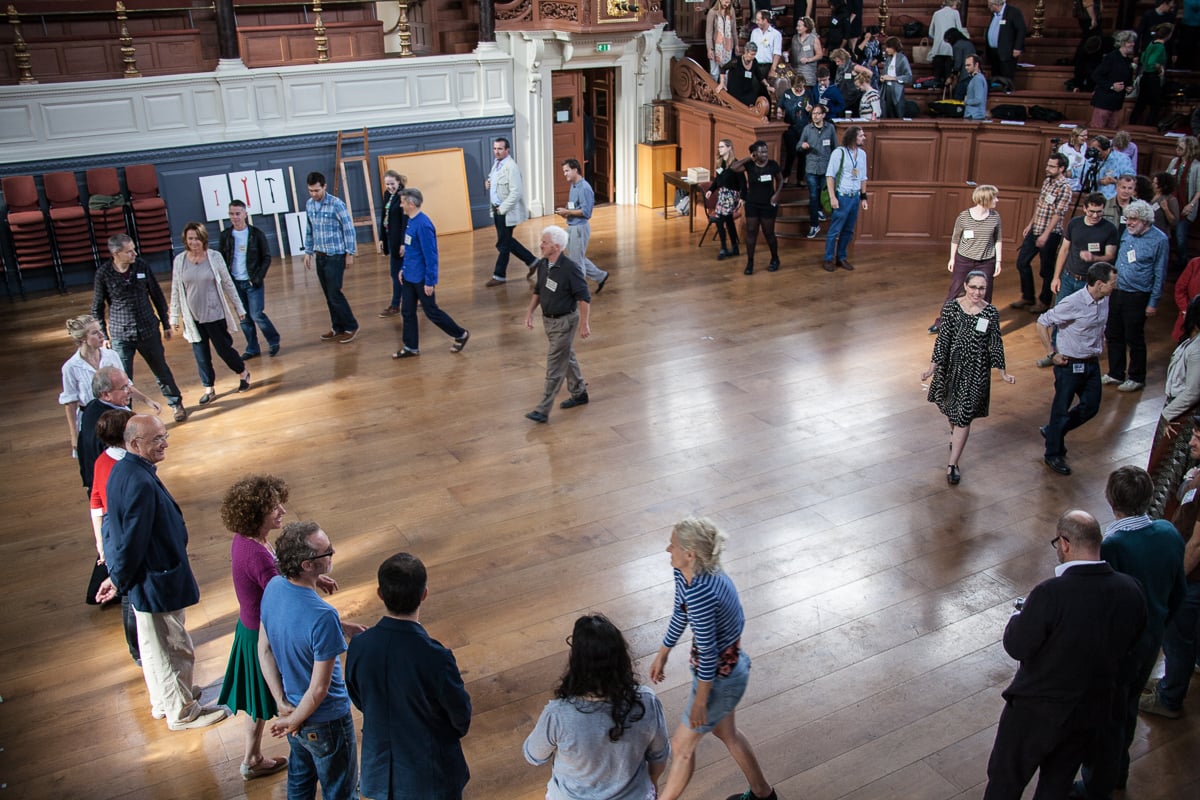
Delegates at a TippingPoint conference
Facing up to climate change
In despair at the lack of an adequate plan for tackling climate change, Peter Gingold urges the arts sector to ask the difficult questions.
Last December there was a momentous meeting in Paris: COP21. It was the culmination of a couple of decades of jumbled diplomacy attempting to come up with a global plan for dealing with climate change. Decades that have driven many of the people engaged with the subject close to despair.
Was it a good deal? A common view (and mine) is that it contrived to be simultaneously a diplomatic triumph – global agreement on anything, with an organisation as weak as the UN driving it, is close to a miracle – and woefully inadequate in terms of the agreements actually reached. The problem hasn’t been solved, not by a long chalk.
The challenge is to respond to the entirely new fact that a casual act will have a direct impact on someone on the other side of the world
This matters because, let’s never forget, we are dealing with a major existential challenge here. The future, climate-wise, is clouded in uncertainty, but one thing we know for sure is that it isn’t going to be like the past. The world our children, certainly our grandchildren, will grow old in will not be as friendly to life as ours is, very possibly markedly so.
This story isn’t just about new ways of getting about or generating electricity. The challenge is to respond to the entirely new fact that a casual act of ours – like going on holiday or keeping warm – will have a direct impact on someone on the other side of the world, someone we will never meet and who might not have been born yet.
Energising a creative response
So we need to hold up a mirror and ask difficult questions about how we live, who we are, about our responsibilities. Questions best asked by thinkers and artists. That is why for the past decade TippingPoint has been energising the creative response to climate change by engaging the arts in the subject.
Given the extraordinary complexity of the subject, is the answer to this artistic challenge to be found by drawing on science, economics, politics or activism, through developing an insight into consumerism, global equity or history? An ever-growing number of artists from all fields have been exploring these themes and more in the performing arts, from the forgettable Greenland at the National Theatre to Steve Waters’ outstanding Contingency Plan. Not to mention the countless theatre, dance, community and workshop projects across the country, all driven by the conviction of their writers and directors that the change we are slowly recognising needs artistic insight.
What is this work for, aside from providing a compelling, rewarding and ideally transformative experience? There will certainly be no single answer to that, but at one level it must be to help us all understand the environmental and psychological change we are living through.
Should it lead to action? Not all feel the need to go that far. Conceptions of a suitable response, if in view at all, certainly vary depending on the artist, ranging from a sense that we all need to live much more simply, to the conviction of a need for radical change politically.
Recent commissions
At TippingPoint we see our job as providing a service for artists aiming to bring the subject into their work, by helping them answer the hard creative questions.
We have commissioned numerous pieces of work on many scales. An example at one end is 3rd Ring Out, by Metis Arts, a performance/installation that toured in 2010 and 2011. Staged in a shipping container converted to resemble a command bunker for a local authority in the 2030s, the audience of 12 were invited to make decisions about local resourcing (police, medical services, etc) in response to steadily escalating challenges, starting with extreme flooding.
It rapidly brought home the difficult decisions that politicians take in extreme situations, and incidentally cleverly side-stepped tedious issues of climate denial. And it was prescient about severe local flooding.
At a different scale was As the World Tipped by Wired Aerial Theatre, which has toured outdoor festivals across the globe since 2011. It plays to audiences of thousands and is based on a stage that progresses to the vertical, becoming the backdrop to projections to which the aerialists respond.
It demonstrates that a very visual approach can make an exciting and powerful impact on a broad audience. (A perpetual challenge with this type of work is the risk of playing to a self-selected audience.)
Vital work
We have no doubt that this type of work is vital. Making a connection through the atmosphere so that this activity can change the life of someone far away is novel, and is not one our psychology is adapted for. It has the most profound implications, of which we have barely scraped the surface.
Peter Gingold is Director of TippingPoint.
www.tippingpoint.org.uk
Join TippingPoint at the Doing Nothing is Not an Option event to be held on 17 to 19 June at Warwick Arts Centre.
Join the Discussion
You must be logged in to post a comment.